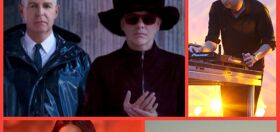 Television news might seem polished and unspontaneous now but back in 1973 (yes they had TV then) a gay activist snuck into The CBS Evening News and interrupted Walter Cronkite’s live broadcast, waving a banner that read “Gays Protest CBS Prejudice” before a viewing audience of some 60 million Americans.
Television news might seem polished and unspontaneous now but back in 1973 (yes they had TV then) a gay activist snuck into The CBS Evening News and interrupted Walter Cronkite’s live broadcast, waving a banner that read “Gays Protest CBS Prejudice” before a viewing audience of some 60 million Americans.
While the story is known to followers of gay history, author Doug Brinkley reveals new details in his current best-seller Cronkite.
On December 11, 1973 Mark Segal—now the publisher of the Philadelphia Gay News but then a 23-year-old member of the Gay Raiders—finagled his way into CBS News studios in New York with a cover story of being a student journalist.
As Walter Cronkrite read a story about in the Middle East, Segal leaped in front of the camera with his sign, forcing the network feed to go black for several seconds. Technicians tackled Segal and wrapped him in cable wire while they waited for the police.
How about we take this to the next level?
Our newsletter is like a refreshing cocktail (or mocktail) of LGBTQ+ entertainment and pop culture, served up with a side of eye-candy.
When the cameras came back on. an unfazed Cronkite told viewers what had happened:”The young man identified as a member of something called the Gay Raiders, an organization protesting alleged defamation of homosexuals on entertainment programs.”
If you think television doesn’t do the LGBT community justice now, just imagine how it treated us 40 years ago. As Brinkley writes, “Television —both news and entertainment divisions—treated gay people as pariahs, lepers from Sodom and Gomorrah. It stereotyped them as suicidal nut jobs, flaming fairies and psychopathic villains.”
Segal and his accomplice were charged with trespassing and, amazingly enough, Cronkite gladly accepted his subpoena to testify about the incident.
If you didn’t live through his tenure, Walter Cronkite was long considered “the Most Trusted Man in America,” a journalist whose integrity was unimpeachable. This reputation is underscored in a story Segal told Brinkley about his trial.
When the court recessed to cue up a tape of Segal’s disruption of the Evening News, Segal felt a tap on his back – it was Cronkite, holding a fresh pad of yellow-lined paper, ready to take notes with a sharp pencil.
“Why,” Cronkite asked the activist with genuine curiosity, “did you do that?”
“Your news program censors,” Segal pleaded. “If I can prove it, would you do something to change it?” Segal went off to rattle off three specific examples of CBS Evening News censorship, including a CBS report on the second rejection of new York City Council gay rights bill.
“Yes, Cronkite said. “I wrote that story myself.”
“Well, why haven’t you reported on the twenty-three cities that have passed gay rights bills?” Segal asked. “Why do you cover five thousand women walking down Fifth Avenue in New York City when they proclaim International Women’s Day on the network news, and you don’t cover fifty thousand gays and lesbians walking down that same avenue proclaiming Gay Pride Day? That’s censorship.”
Segal’s argument impressed Cronkite. The logic was difficult to deny. Why hadn’t CBS News covered the gay pride parade? Was it indeed being homophobic? Why had the network largely avoided coverage of the Stonewall riots of 1969? At the end of the trial, Segal was fined $450, deeming the penalty “the happiest check I ever wrote.” Not only did the activist receive considerable media attention, but Cronkite asked to meet privately with him to better understand how CBS might cover gay pride events. Cronkite, moreover, even went so far as to introduce Segal as a “constructive viewer” to top brass at CBS. It had a telling effect. “Walter Cronkite was my friend and mentor,” Segal recalled. “After that incident, CBS News agreed to look into the ‘possibility’ that they were censoring or had a bias in reporting news. Walter showed a map on the Evening News of the U.S. and pointed out cities that had passed gay rights legislation. Network news wa never the same after that.”
Before long, Cronkite ran gay rights segments on the CBS News broadcast with almost drumbeat regularity. “Part of the new morality of the ’60s and 70s is a new attitude toward homosexuality,” he told millions of viewers. “The homosexual men and women have organized to fight for acceptance and respectability. They’ve succeeded in winning equal rights under the law in many communities. But in the nation’s biggest city, the fight goes on.”
Not only did Cronkite speak out about gay rights, but he also became a reliable friend to the LGBTQ community. To gays, he was the counterweight to Anita Bryant, a leading gay rights opponent in the 1970s: he was a heterosexual willing to grant homosexuals their liberties.
During the 1980s, Cronkite criticized the Reagan administration for its handling of the HIV/AIDS epidemic and later criticized President Clinton’s “Don’t Ask, Don’t Tell” policy regarding gays in the military. When Cronkite did an eight-part TV documentary about his storied CBS career – Cronkite Remembers – he boasted about being a champion of LGBTQ issues. And he ended up hosting a huge AIDS benfit in Philadelphia organized by Segal, with singer Elton John as headliner.
And that’s the way it was.
Photos: CBS, NASA/Bill Ingalls



















Jonathonz
What a great story! Who knew? Thanks Queerty! Keep it up!
Belize
JAYKAY: “Mark Segal should have been put to death for for trespassing. It’s because of liberal hoodlums like him that America now knows that homosexuals exists via the evils of television. Because of him, I had to marry that manly broad I call a wife just so I won’t get bashed in my hick town.”
There you go, honey. I’ve already posted a comment that more or less summarizes your view over such matters. I know that it may seem too proactive of me but I just don’t want you to waste time commenting on Queerty when you can be doing the things that you love–painting Fred Phelps’ house… or sending your nude pictures to Jenna Talackova with such witty comments like “get your penis back to get with this.” 🙂
EvonCook
When I volunteered at Out Of The Closet Thrift Shop, New York City’s first AIDS charity store, Walter Cronkite called up and offered a donation for us to sell which we went to pick up at his East Side townhouse. When we arrived, hearing him talking in the next room, we were given a fine collection of his old formal wear (tuxedos etc.). He was only one of many important and famous donors, but he was the kind of journalist we don’t see much of today.
FunMe
The trail blazers and the ones that helped open the doors for us. Thank you Mr. Mark Segal and Happy Pride!
FunMe
And of course, let’s not forget our straight allies who are intelligent and caring enough to learn about what they don’t know so that with their influence that can help us change the world. GREAT JOB MR. CONKRITE!
PS Great to hear that Segal gentleman is alive and kicking with the Philadelphia Gay News.
WillBFair
There’ll always be spin doctors like Cronkite to distract attention from the media’s real agenda, which is to use us as a distraction from political and financial corruption. So Cronkite throws a fund raiser. Big deal. He also put forward the con of media objectivity for who knows how many decades. Please Mary. Cronkite is a con man of commercial media, no matter how many fund raisers he throws. By legitimizing a media that still trashes us daily, he’s done a thousand times more harm to us.
jaack
JAYKAY blamed TV for his “hick town” and marrying a woman he hates. Why didn’t he get out to San Fran or NYC or South Beach? We had FAIR & less biased reporting with Cronkite. The network will always have its biases. The Phil Gay News is a fine newspaper led by Segal (www.epgn.com). Do some reading instead of bashing. If you have a chance to marry USE it before it is taken away. I wasn’t in Ca. until after the election & couldn’t get married to the man I love in Ca.. I went to Connecticut and got married there Dec 23, 2008, our XMAS present after 31 years together
Raymond Saint-Pierre
Message from the Jurassic age of Faggotry. Walter Cronkite was a man of his word. And he told the truth when the information was presented to him. He did so about Vietnam, Watergate, and countless other issues among them civil rights for the black community, women, and lgbt communities. He truly gave meaning to the word “integrity”. Like Edward Murrow, he stood up for what was right and did not bow to media bureaucrats like our omnipresent Roger Ailes. Shame on those of you who can’t/or won’t remember/learn history. In this case, the facts speak for themselves. WTFDIK
Red Meat
Look at everyone applauding this because it happened so long ago, if any of those “annoying gay groups” did that today you would all be clamoring how stupid it would be.
FunMe
@jaack: Was JAYKAY’s original comment deleted? I see people commenting on his entry, but I don’t see what he wrote.
By the way, I ALWAYS laugh at the CONservatives who come here. They’re SO transparent.
Snj
I love Mark Segal. He remains a potent force around LGBTQ issues. In Philadelphia, he helped to secure the building that houses the William-Way LGBTQ community center. And most recently has spearheaded a successful effort to secure federal funding and land to build an LGBTQ senior housing complex. His paper continues to win press awards and Mark has long been considered a local power broker (in a good sense) in Philly politics.
Rood
I can confirm that the incident made a deep impression on Mr. Cronkite.
Two weeks after the event, in Arizona, I cooked Christmas dinner for the Cronkite family (plus some 100 other guests). After dinner, and after some Holiday entertainment, Mr. Cronkite held forth at a late evening cocktail party, during which he specifically mentioned the incident … told us all about it. For all the world-shaking news items he had covered in those two weeks, he chose to talk about the gay raid. Obviously it was on his mind.
He seemed taken aback by the whole affair. I presume this was before the court session, as he laughed slightly, as he told the story, as though he expected us to laugh with him. I sensed he expected everyone to see it as a blatant example of pure effrontery on the part of the gay activists, but if so he was mistaken. I want to think our failure to laugh told him something.
It’s great to hear how it all came out …